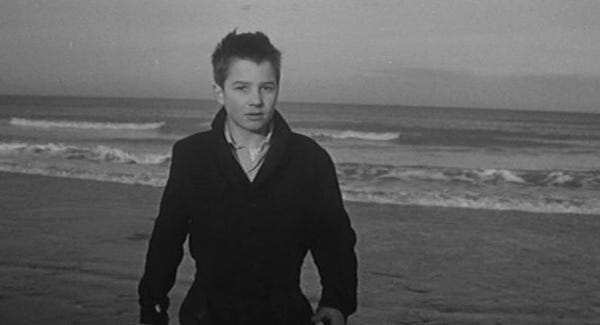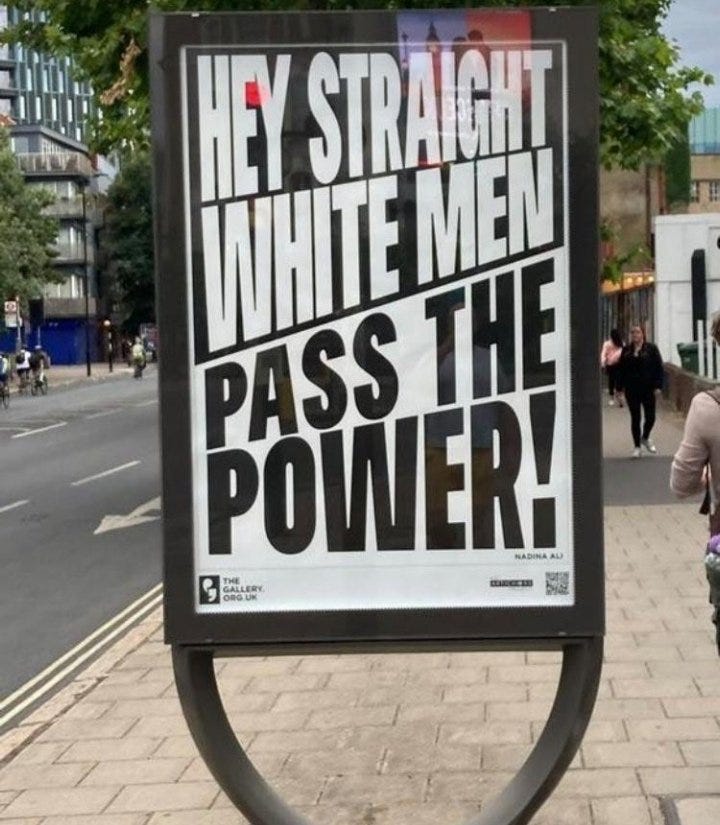This week, I ventriloquized Adrian Chiles for ‘The Critic’ here.
‘Stiff Upper Quip’ is 18 months old today. Hooray! To celebrate, I’ve dropped paid subscriptions on the newsletter by 5%!
A monthly subscription now just costs £4.25 a month. Convert and update here for extra posts and full archive access.
And I’d also remind you that my upcoming ‘Interintellect’ salon, on the topic of ‘How to Fail’, takes place next Friday, March 10th. Tickets at the link!

It’s rare to get my moderate middle-aged blood to boil, but a recent Guardian column asking why straight men didn’t write about their private lives achieved it.
Well, gosh, let’s think. If you create an editorial culture where acres of columns are given to exploring every particularity of other identities (this week us a columnist regales her with her view on the ‘circumboob’), while men don’t even get to own a shed or go bald in peace, perhaps that isn’t a conducive atmosphere to get the fellas to open up in.
Frankly, the ‘male dating advice’ column the writer calls for in that piece wouldn’t survive The Guardian’s editorial guidelines for five minutes; there are men in the real world and men as The Guardian would have them to be, and these men largely do not currently overlap.
But, of course, as a middle-aged, slightly fermented species of man, I could take it; I viewed it with the slightly ironized detachment I view all such discussions of masculinity on the progressive left with – a sense that these people are talking to themselves, more worried with cultivating their own images – oh, you’re concerned about how men are struggling now are you? Just not enough to stop writing articles about how awful they are, right, right – than honestly exploring things.
And we have to ask how seriously we should take the current progressive view of straight men. Either cisheteronormative male sexuality is a brute and colonizing force throughout history or it’s not, but it can’t be the former and also be something nice and positive that men should share with us all. Accepting the intersectional view of the world, the identity of straight men surely remains so disruptive that the best thing would be for them to sit on the naughty step for a few centuries and think about all that they’ve inflicted on the world.
For me, this view of male power is something of a genuflection, an expression of conceptual piety often not maintained when the same writers get offline and express what they actually want from men. And by now I also know there are good conversations about masculinity happening elsewhere, led by men, amongst men, between men and women too. The Guardian can chatter away to itself.
However, I might not have felt like that when I was younger. I think if I were trying to be both a young man and a progressive person today, I would have been very confused as to how to act or behave.
The aforementioned gap between what is being said and what appears to be wanted from young men is a confusing space for them to exist in. And young men have to a degree always been the problematic exemplar of our species – they are the biggest perpetrators and often the victims of young male violence, they engage in the most risky recreational behaviours and also see increasing issues around educational attainment, particularly for working class boys. Nearly eight out of ten suicides are men; from 20 to 49, it is the most common cause of male death.
But away from these more dramatic aspects of male experience I’d say there’s a permanent generalized air of young male confusion. I would like to focus on one aspect of why young men today might be particularly feeling this. I am not saying this is the only factor, but it is one I am alive to: That their current experience is not being honestly acknowledged.
Let’s take this sign:

Now, let’s imagine the people walking past this sign. And let’s imagine only the straight white men amongst them. Do we honestly think that all those straight white men will have the same level of power? A 60-year old CEO on the way to the office will have the same power as a jobless 19-year old on the way to the job centre to hear about a potential internship?
And yet, undifferentiated by any class or economic analysis, these men are being addressed as all the same. Which means in practice even a very decent young man is being told to give up power before they have even attained any. And that, I think, must cause a lot of confusion in young men, and confusion often finds expression in rage.
Acknowledging that the basic physical privileges young men enjoy have not gone away, young men are being treated as if they have attained a status they have not yet. And this embodies a level of insensitivity and indifference to male experience that can only be enraging – while the fact that members of this group has indeed been historically dominant plays no role in the impact of this being their experience right now.
Gloria Steinem says that for men getting older is an experience of gaining power and for women of losing it; for women, the currency society values most in them, their looks, decline, whereas men’s social status and wealth increase with age. You could argue this has a certain cosmic fairness, as both sexes get their turn at being powerful, though it’s still essentially unfair to women given it is much easier to make money over time than try to hold onto beauty as you age.
But still, it follows that the experience of young men, before they’ve accumulated much of anything, is usually the period of their life where they have the least power in relation to both their future selves and other men.
If I could communicate anything to my female friends about the male experience, it would be just how poor your cards are in early adulthood as a man. You have no money, perhaps you are stuck in a badly paying job; you may well not have worked out exactly what you want to do in life. And there is also often a deep sexual recession for young straight men – you may even have been doing quite nicely for female company as you moved through educational institutions, gaining grades or being socially popular, but dumped now in the ‘real world’ you see yourself consistently gazzumped by older men.
Personally, I experienced nearly two years without sexual contact with anyone; it was a source of great pain to me at the time, aside from the feelings of shame which sexual rejection always brings. Perhaps others of my cohort were doing better but still –by our late 20s, it was a totally different story for myself and all my male friends, seeing us all much more adept, relaxed and successful with the opposite sex.
Clearly, while young women face their own challenges – and the attention they get from men in early adulthood is often unwanted – they are generally having a very different experience, of their maximum currency as a sexual object, at this early adult stage. At the time when young men’s options for sex shrink, women’s peak.
The young man wants to establish themselves professionally too. But even if you do know what you want as a young man, you may have no idea how to obtain it. Perhaps you haven’t met the right people; perhaps you spend most of your time commuting, overall you’re not formed. This is why the poet Thom Gunn said that young men identify with Hamlet: ‘They’re unhappy in an a formless sort of way… [they’re] undefined, and being undefined is rather painful.’
This is the root, I suspect, of why profoundly unhappy young men look for a cause and even a bad one will do.
My focus today is on how the progressive left talks to such men. I think it is a very, very bad approach to assume that any young man at this stage is experiencing their life as one of privilege – and to to speak as if a skint young dude is remotely analogous to a 60-year old straight white guy who went from public school to Oxford to running a minor arts institution for 80k a year. But the progressive response has become so crude and hostile that it honestly thinks it can treat these two examples of masculinity as the same - hence the bollard.
What really helps young men is the guidance of elders. This meme has a lot to be said for it.

I took a lot of solace from intergenerational friendships in early adulthood; older friends who helped me negotiate the transition from the patterns of educational structures – whether you’ve excelled or failed within them – to becoming a full member of the tribe.
Generally this guidance for young men is male in nature. I remember in my early days in Berlin, depressed in a freezing winter, ringing home and my Mum, bless her, saying ‘Why don’t you just pack up and come home?’
I can’t emphasize enough that while this advice was lovingly meant it was the exact opposite of what I needed to hear – that my task at that point was to establish myself and my own life outside the family unit. And within the family unit, it was marked by a shift from paying attention to my Mum to more needing and understanding my Dad’s perspective on things. Like many men, I grew closer to my father in early adulthood; after all he’d had a crack at being a young man once and for good or ill had got through.

I should point out – it’s the kind of thing people won’t automatically assume if I don’t – that I consider feminism responsible for none of contemporary men’s problems. But feminism is a movement concerned with the liberation of women; its fundamental role is not to produce decent men and integrate them into society. Of course, there are movements within feminism, the Andrea Dworkin, lesbian separatism, end of things, which are explicitly hostile to men of all varieties, but it’s never fair to define any movement by its extremists; the same goes for the rabid end of MRAs too.
Anyway, I seriously doubt young men radicalized into being Andrew Tate fans are doing that out of passionate disagreement with Valerie Solanos. Most women, in my experience, are sympathetic to men, see that they have their unique challenges, and are interested in hearing men describe their experiences – just not in exclusively hearing men describe their experiences.
But this is why that Guardian article decisively set my teeth on age; that same paper and progressive trends more generally love to tell men how we’re thinking and feeling, often presenting as typical the flattest caricatures of masculinity.
On Twitter, we see an endless cheap chorus decrying men’s inability to talk about their feelings, their lack of interest in their partner’s sexual pleasures, their refusal to do chores around the house. By now I just think: Who are these men you’re all dating? Every journalist with a Twitter account seems to be romantically involved with Don Draper. For my part, I went to a rough comprehensive school in Nottingham and my male friends probably don’t exemplify liberal sensitivities but all of us do the chores, listen to our partners and read books by women.
Furthermore, the stereotype of universal masculine emotional constipation seems itself to me more than a little out of date. In my close male relationships, I don’t see it – my Dad is an 83-year old bloke from Wrexham and we tell each other we love each other all the time. Always have.
It’s often remarked too that men prefer to express things by doing things together as opposed to discussing them but on a fundamental level - that’s fine, right? You only have to watch the video of Hibernian fans – both male and female of course – singing ‘Sunshine on Leith’ after their victory in the 2016 Scottish Cup Final to remind yourself that a lot of real emotion still comes out through bonding activities.
For straight men, indeed for all men, it just seems all to me a more complex picture than before. To a large extent all the old privilege of being a man continues to exist; the ability to walk around without harassment; the rewards for athletic achievement; the danger and protective capacity of male strength.
And yet in some industries, such as the arts and media, straight white men are quite out of fashion; every week I see hundreds of shout-outs for arts applications, and in a decade I have never seen a single one calling for work from straight white men. The instinctive progressive response is ‘Because that’s the default and they always get promoted anyway’ – but do they? Do they still? Even young straight white men today?
I don’t think that progressive discourse is currently capable of acknowledging this kind of duality; indeed, it prefers to go on pretending that the status of straight men hasn’t changed since the 1950s. At the same time, progressives increasingly set straight white men up as a safe cultural joke, the group you can let off steam by saying something reductive about – to the extent that you can obtain public funding for a poster campaign telling them to ‘pass the power’ they may not even have.
And this confuses most of all young men, who are always confused anyway. Young men have all that tricky self-definition ahead of them with an increasing sense the wider culture is hostile to them and their aims. And they’re not even able to express that without worrying they’re indulging their own privilege. No wonder someone like Jordan Peterson resonates; nowadays, he’s increasingly off-piste, but he initially became wealthy just by telling young men to stand up straight and keep their rooms tidy. If such insights being marketable aren’t symbolic of a widespread masculine longing for leadership, I don’t know what else could be.
I think what confuses progressives here is that this sense of powerlessness and frustration in young men can absolutely co-exist with a sense in other groups that straight white men are still keeping them down. All the older white male gatekeepers are still there. A lot of the old awful male behaviour is still there too.
What I need to convince progressives on – and by the way, I am not for an instance saying progressives are responsible for young male radicalization – is that they need a better answer to young men, and indeed all men, than ‘I’m afraid you’ve had your turn’. There is still goodwill and a desire to support young men out there, but it’s not going to be led by people who post ‘Y are men tho’ for 20k likes on Twitter.
As a first step, I’m sure The Guardian can start by commissioning a few straight male writers to write about their love lives. There must be some of us out there.



